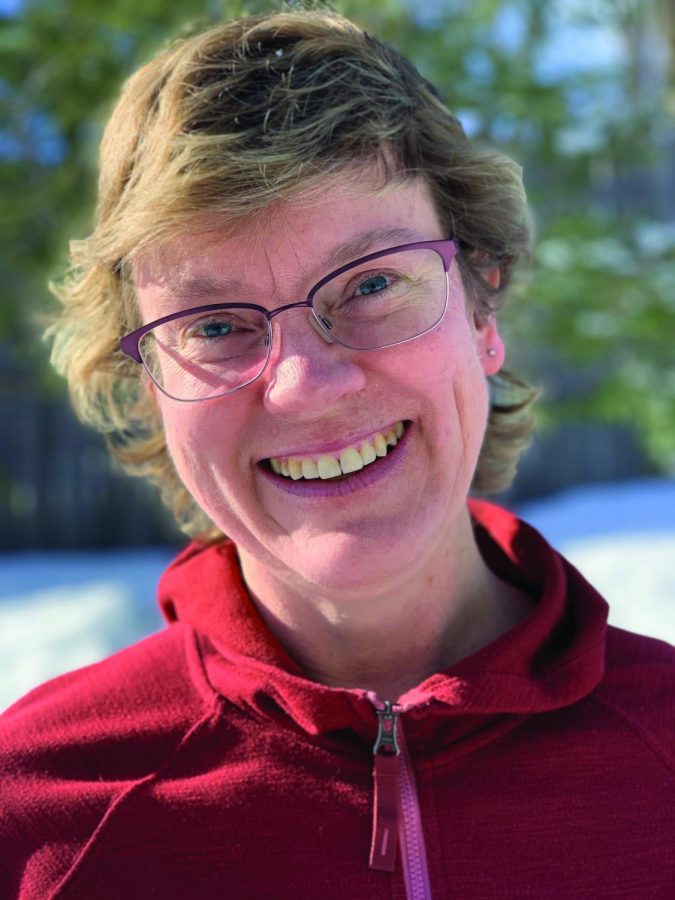Jennifer Lutman: Teaching Writing as a Craft
Director of the Writing and Speaking Center (WSC) Jennifer Lutman has dedicated her career to teaching students the craft of writing. The WSC is a resource available to all students who seek any kind of assistance with writing or speaking, regardless of the subject matter.
“In the WSC, my work consists primarily of creating and maintaining a system in which the remarkable students who work here can do their jobs to the best of their ability. This includes ‘frontline’ work with them in training in effective tutoring practices, as well as behind-the-scenes administrative tasks such as scheduling, budget balancing and publicity,” she explained.
The WSC staff of peer consultants are students selected by Lutman herself, and trained to offer all kinds of writing and speaking support.
“The consultants are as devoted to their work as they are talented in performing it, and the students who meet with them frequently express gratitude for their help,” she said.
The WSC is located in Lathrop Hall and, under normal circumstances, students are able to meet face-to-face with consultants during their appointment. The aim of the WSC is not for the consultants to go through and edit students’ papers for them — the goal isn’t even to help students achieve As on individual papers — but rather to strengthen someone’s writing skills for long-term improvement. According to Lutman, the spatial design of the room actually allows the consultants to give each other feedback after clients leave.
“It’s kind of remarkable, actually, how dynamically their practices inform each other. They share tutoring strategies with each other, celebrate each others’ work and even make appointments with each other for help in their own writing,” she said. “Sometimes I say, with very little irony, that one of the best things I can do as WSC director is stay out of the consultants’ way!”
Lutman was first hired by Colgate in 2006 as the Interim Director of the Writing Center. In 2010, as the Director, she sent a request to the administration regarding the expansion of the center to include support for public speaking in response to feedback from students and faculty. Thus, the center was officially renamed to the Writing and Speaking Center. Lutman is also a professor in the Writing and Rhetoric Department, and teaches first-semester seminars (FSEMs) and writing courses.
After meeting one-on-one with a consultant, students are asked to submit evaluations. The feedback received over the years has been overwhelmingly positive and only confirms the impact that the center has on individual students. According to Lutman, more than half of all clients who visit the center once end up deciding to return, which is a convincing indication that most students find their first visit helpful. Additionally, in any given year, approximately one out of every four Colgate students will visit the center at least once.
“It takes enormous courage to make oneself vulnerable and share writing. Even constructive criticism can be difficult to hear. All I can do is assure students that I have selected consultants who are not just strong writers and speakers themselves, but nonjudgmental and empathetic people who appreciate how difficult writing can be,” Lutman said.
As an undergraduate, Lutman was invited to work for her college writing center as a tutor. This experience is what helped set her on her career path and, after graduating as an English major, she pursued a Master’s degree in English literature and later a Master of Fine Arts degree in creative writing. With more than 400 books patiently waiting to be read on a list she keeps on an app and a life-long history of teaching experience, you could say she has quite the passion for reading, writing and the study of language.
The most discouraging and heartbreaking part of her job at the WSC is hearing about the negative experiences of students whose writing deviates from the dominant form.
“There is a widespread belief that certain deviations from the conventions of Standard U.S. Written English are de facto marks of a poor writer or thinker. The attitudes that flow from this belief can be damaging,” she explained. “It breaks my heart to hear unabashed judgment of people for their usage of a particular word, construction of a sentence, or slippage of idiom. Language is one realm where people whom I deem otherwise kind and self-aware can utter sentiments that strike me as remarkably elitist or ignorant. It is especially difficult to hear language prejudice expressed because the history of Standard English is bound so tightly and complexly with whiteness and racism.”
In a different context, non-standard writing could be perceived as highly sophisticated and effective. Despite this reality, sometimes students have been made to feel inferior, or told that they are poor writers throughout their education.
“Writing too often seems narrowly defined in school settings as writing in Standard Written English. But brilliant writing is produced every day, that deviates from the conventions typically expected in academic writing,” she said.
“It is one thing to ask students to follow the conventions of a particular language variety in particular genres and contexts; it is quite another to imply, or even suggest directly, that because a student’s writing exhibits features of a language more familiar to them… they are deficient thinkers or users of language. When I run into evidence that a student has been made to feel deficient in this way — yes, those are hard days,” she said, “because it can be difficult to disabuse them of this belief, which often stands as an obstacle to their further learning and skills development.”
Despite these hard days, Lutman has a lot of pride in the WSC and the incredible student consultants with whom she works with daily.
“I love that every day is different and that every day I get to interact with kind, funny, smart and creative people who help me grow, even if I’m the one officially called their ‘teacher’ or ‘supervisor,’” she said.
Ani Arzoumanian is a senior from Ridgewood, NJ concentrating in neuroscience with minors in creative writing and anthropology. She volunteers as a firefighter/EMT...










